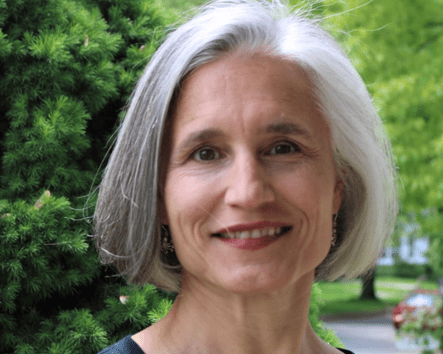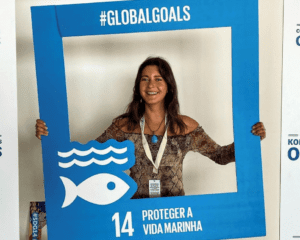
Dr. Andrea Grottoli
From April 4th-6th 2023, a community of solvers from around the world gathered to share and advance knowledge and solutions to critical challenges at the ocean-climate nexus as part of Ocean Visions’ 2023 Biennial Summit.
Ocean Visions spoke with Summit speaker Dr. Andrea Grottoli to learn about her experience.
Ocean Visions: Can you tell me about your career journey and the work you lead now at The Ohio State University? How did you hear about the Summit and become a speaker for one of the sessions?
Dr. Grottoli: I grew up in Northern Ontario spending my summers on the Great Lakes. I loved the outdoors and this passion made me want a career making the planet a better place, combining being in charge of projects and solving problems. During graduate school I randomly ended up in a lab studying coral reefs, where I got the opportunity to go to Hawaii for research. At this point I thought I would end up working for EPA in remediation, but after that trip I fell in love with the potential for solutions in the coral reef field. I wanted to study how feeding affects the skeleton of coral and our team continues to make discoveries to this day about its importance. For corals, feeding can make the difference between surviving and dying, especially when stressed. I went on to get a PhD and develop technology to promote feeding opportunities in stressed coral. I am now at Ohio State where I have continued my research.
Once I developed this technology and got a provisional patent, my audience expanded from primarily academics to a wider range of people and industries. I got a notice from the American Geophysical Union about the Ocean Visions Summit, so I signed up and submitted an abstract.They accepted and asked me to come speak.
Ocean Visions: From an academia perspective, what was the most interesting take away from the Summit?
Dr. Grottoli: The most interesting aspect for me is how academia is now blurring into a more applied area. Whereas professions such as engineers have always been more applied in their approach, the same shift is happening in earth and life sciences. The field is beginning to integrate more as the scope of what we can and are inspired to do is expanding. A solution-based mindset is growing in scientists due to the climate and environmental problems we are facing.
Ocean Visions: What do you see as the biggest opportunities in the education field as it relates to advancing solutions in the ocean-climate space?
Dr. Grottoli: The scope of what we can encourage students to do and the mindset of what is possible is broadening. Solutions-based research as well as teaching a solutions-based outlook has expanded in the classroom. This framework percolates from classes at the intro level all the way up to graduate level classes and research. When PhD students graduate, they are becoming more likely to look at industry and startup options rather than just academia. They’re realizing they can do more things with their degree. In fact, I was able to bring one of my grad students to the conference and it, being her first one, was an exciting way for her to see all the possibilities of this sector.
Ocean Visions: Who were you able to make connections with and why do you think those will be of value to both your and their career?
Dr. Grottoli: I was able to make connections with faculty at another institution, and as we develop intellectual property we can be of assistance in bouncing ideas off of each other. I also got the chance to meet people involved in NGOs that can be connected with potential investors and lead to growth in my marine technology. Excitingly, I also spoke with an early career female researcher and was able to mentor her; it was inspiring to not only learn for myself at this conference but to be able to support others.
Ocean Visions: Can you tell me about some of the most interesting or compelling ideas you heard at the conference? Which ideas gave you the most hope in the otherwise dire situation that climate change can seem like?
Dr. Grottoli: One of the most interesting ideas I heard about was a group at the University of Washington working to develop technology that will remove CO₂ from the ocean instead of air. This was exciting to me because when removing CO₂ from the ocean, it frees up availability in its carbon sink to then also take more out of the atmosphere. However this could be a 10-20 year solution and we will need other solutions that are implementable now, such as the technology I have developed.
Ocean Visions: Is there anything else you would like to share that I haven’t gotten to ask yet?
Dr. Grottoli: I am a patent holder of a device that works under water that draws zooplankton to stressed coral using light. As coral cannot photosynthesize when they are stressed, they must turn to alternative ways to gain nutrients, such as feeding. This light concentrates zooplankton on the coral and provides them more opportunity to feed, better equipping them to cope with heat stress and acidification. This is a great solution to help our corals that is ready to move to the scaling up phase for large impact.

